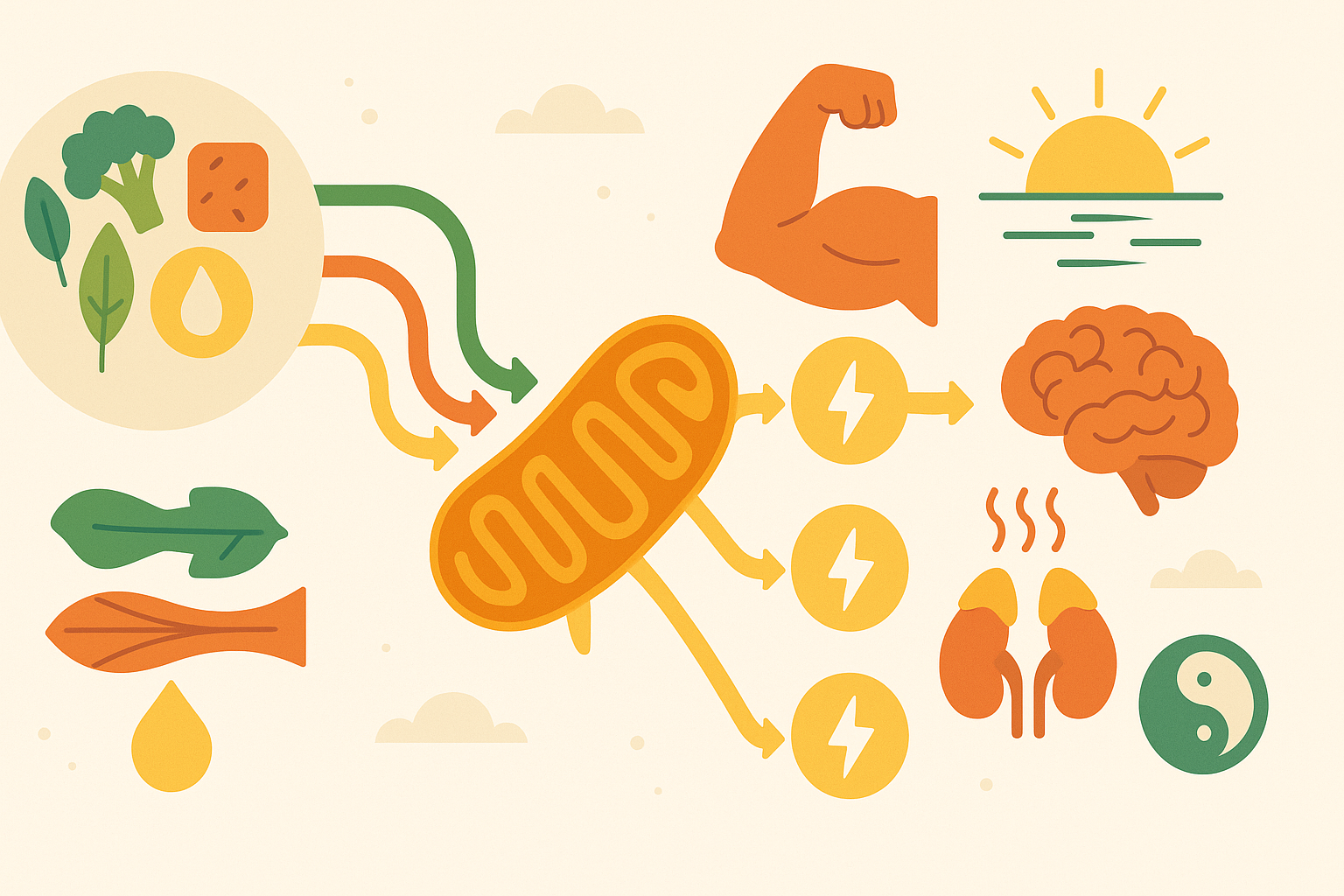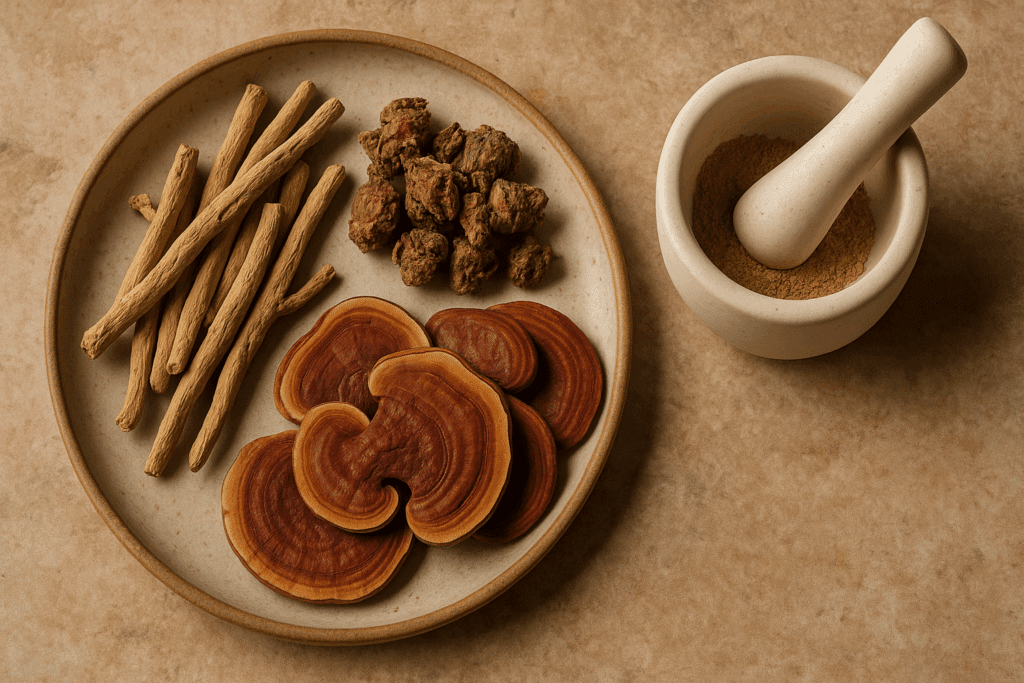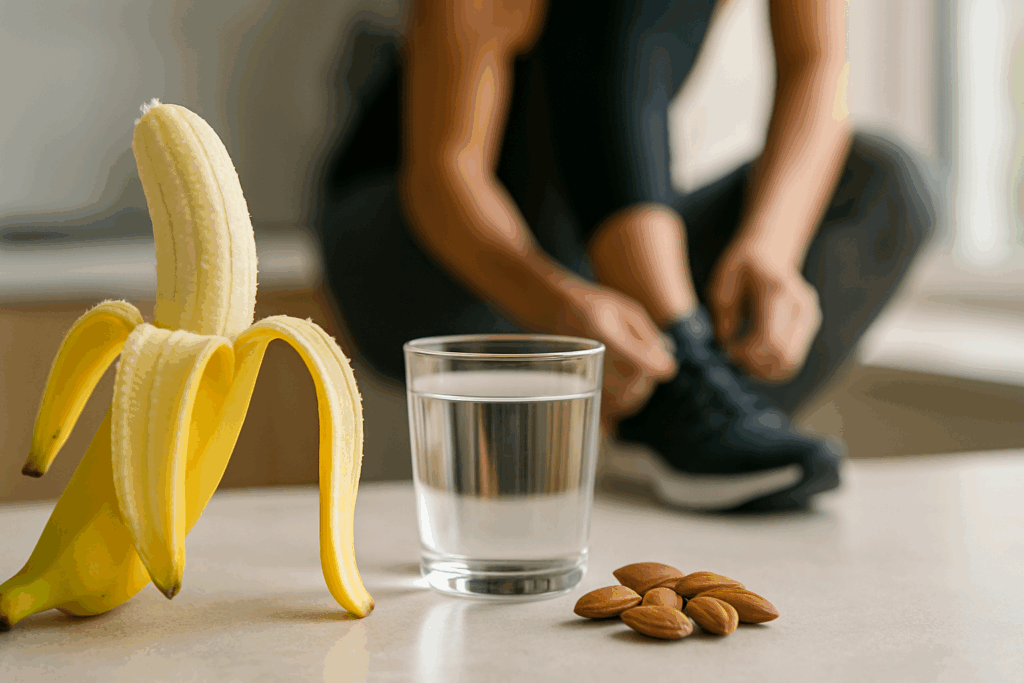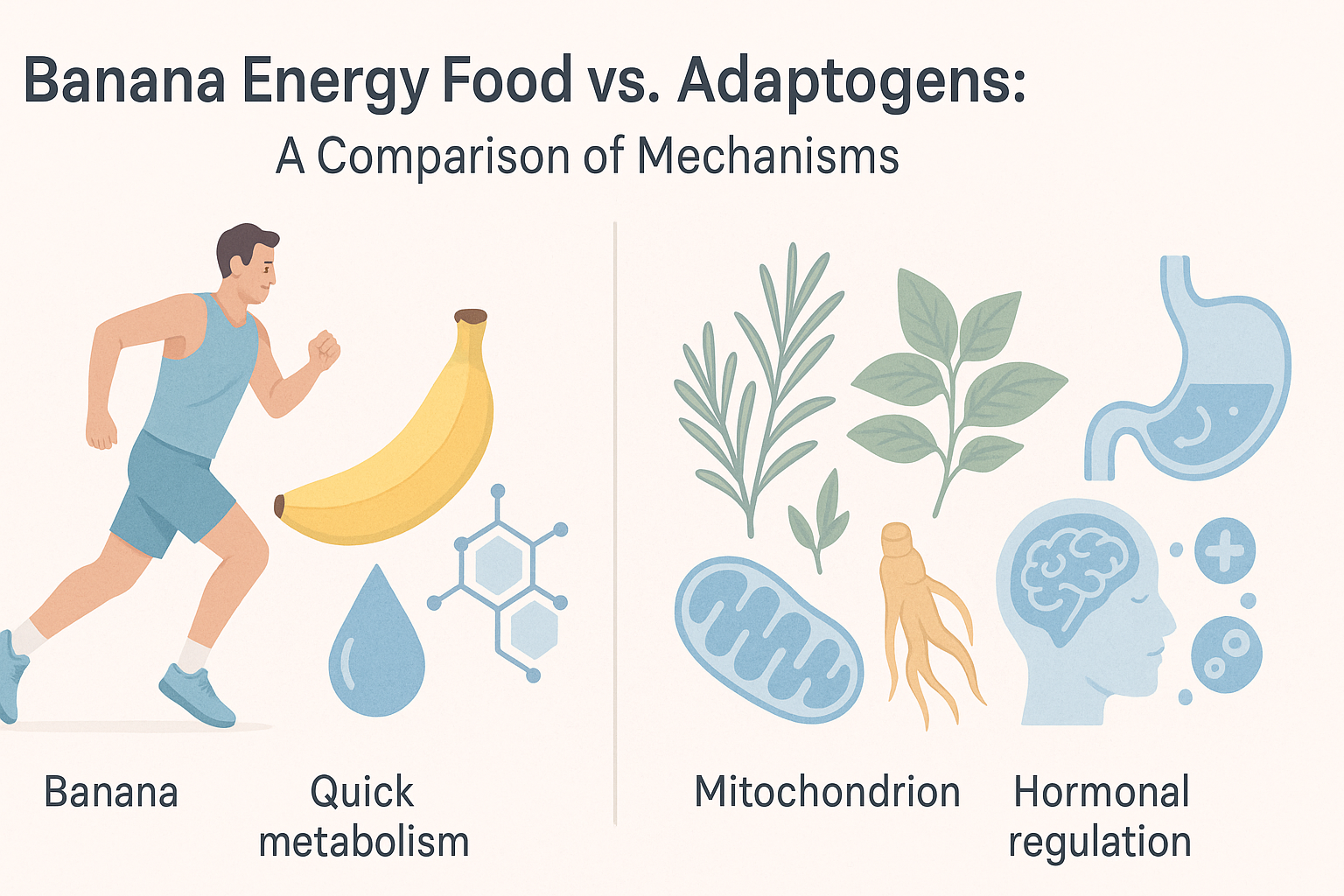In the ever-evolving world of nutrition and wellness, consumers are inundated with claims about what foods, herbs, and supplements can truly boost vitality and support long-term health. Among these, one question frequently pops up: are bananas good for energy? This query reflects more than just curiosity about fruit; it points to a broader interest in natural energy sources, especially those that may offer alternatives to synthetic stimulants or caffeine. In exploring this topic, it is crucial to also consider the rising popularity of adaptogens and how they intersect with the body’s energy production, stress resilience, and overall physiological balance. When we examine bananas and adaptogens through the lens of scientific research, nutritional biochemistry, and practical application, a more nuanced and surprisingly insightful story emerges.
You may also like: Unlock Powerful Stress-Relief with Adaptogenic Mushrooms and Stamina Herbal Support

Understanding the Role of Energy in Human Physiology
Energy, in its biological context, refers to the body’s capacity to perform work—from cellular metabolism to muscular contraction. This energy is generated primarily through the oxidation of macronutrients such as carbohydrates, fats, and proteins. However, not all energy sources are equal in their speed, sustainability, or systemic effects. For example, simple sugars might offer a quick spike in blood glucose, resulting in temporary alertness, but often lead to a subsequent crash. On the other hand, complex carbohydrates and certain nutrients can provide sustained release and improved metabolic efficiency.
Understanding how various foods affect mitochondrial function, glucose regulation, and neurochemical balance is critical for making informed choices. Beyond food, physiological energy is also influenced by hormonal regulation, circadian rhythm, and neuroendocrine feedback loops. It’s here that adaptogens play a vital role. These natural substances support the body’s ability to adapt to stress and stabilize metabolic processes, offering a longer-term, more stable form of vitality than quick fixes like sugar or caffeine.

What Are Adaptogens and How Do They Support Energy?
Adaptogens are a class of herbal compounds that help the body resist physical, chemical, and biological stressors. They work primarily through modulation of the hypothalamic-pituitary-adrenal (HPA) axis, thereby regulating the secretion of cortisol and other stress-related hormones. This modulation does not suppress the stress response but rather balances it, preventing the overproduction of stress hormones that can lead to fatigue, inflammation, and metabolic disruption.
Examples of well-researched adaptogens include Rhodiola rosea, Ashwagandha, Eleuthero (Siberian ginseng), and several types of adaptogenic mushrooms such as Reishi, Cordyceps, and Lion’s Mane. These substances have shown promising results in improving stamina, reducing mental fatigue, and enhancing overall resilience. For instance, Cordyceps has been associated with increased ATP production in mitochondria, which directly enhances cellular energy. Reishi and Lion’s Mane support cognitive energy by enhancing neuroplasticity and reducing inflammatory markers that can impair brain function.
In the realm of stress-relief and anxiety support, adaptogens play a dual role: they stabilize mood through cortisol modulation while also preserving physical and mental energy. This makes them particularly valuable for individuals facing chronic stress, burnout, or adrenal fatigue.

Are Bananas Good for Energy? A Scientific Perspective
When people ask, “are bananas good for energy?” they’re often referring to the fruit’s immediate ability to combat fatigue or support physical performance. Bananas are rich in carbohydrates, primarily in the form of natural sugars like glucose, fructose, and sucrose. They also contain fiber, which helps modulate the release of sugars into the bloodstream, providing a balanced source of fuel rather than a rapid spike.
Moreover, bananas contain a variety of micronutrients that contribute to their reputation as a powerful banana energy food. These include vitamin B6, which plays a crucial role in neurotransmitter synthesis and amino acid metabolism; potassium, which supports muscle function and electrolyte balance; and magnesium, known for its role in ATP production and nervous system regulation. The combination of these nutrients makes bananas an effective and accessible source of physical energy, particularly useful for athletes or individuals in need of a pre-workout snack.
The real value lies in bananas’ unique synergy of fast-acting and sustained-release energy compounds. Unlike processed snacks, they provide glucose in its natural form along with the micronutrient cofactors needed for optimal metabolism. This makes them more than just a sugary pick-me-up; they function as a whole-food energy source with metabolic benefits.

Banana Energy Food vs. Adaptogens: A Comparison of Mechanisms
While both bananas and adaptogens contribute to energy, they operate on different timelines and physiological systems. Bananas offer immediate metabolic fuel, suitable for replenishing glycogen stores and maintaining blood glucose during physical activity. This is why athletes often rely on bananas before or after intense workouts. Their digestible carbohydrate content is quickly converted to usable energy, while the fiber and micronutrients provide stability and recovery support.
Adaptogens, by contrast, take a more systemic and long-term approach. They don’t deliver calories or glucose directly but instead optimize the body’s internal systems to use energy more efficiently. For example, Rhodiola rosea has been shown to improve oxygen utilization and reduce lactic acid build-up, thereby enhancing endurance. Lion’s Mane promotes the synthesis of nerve growth factor (NGF), which can indirectly enhance mental stamina and clarity over time.
A synergy arises when adaptogens and nutrient-dense foods like bananas are combined. The immediate fuel from bananas can support acute energy demands, while adaptogens work in the background to maintain hormonal balance, reduce inflammation, and support mitochondrial function. This layered approach to energy is particularly valuable in managing chronic fatigue, cognitive burnout, or stress-related performance declines.

Do Bananas Give You Energy During Stressful Periods?
Stress depletes the body’s energy reserves rapidly, particularly by taxing the adrenal glands and increasing cortisol production. During such periods, nutrient-rich, easily digestible foods can offer immediate support. So do bananas give you energy when you’re under pressure? The answer lies in how the body processes glucose and key electrolytes during stress responses.
Glucose serves as the brain’s primary fuel, and during stress, glucose metabolism accelerates. Bananas, with their balanced sugar composition, can provide this needed fuel without overwhelming the system. Additionally, the potassium in bananas helps regulate blood pressure and prevent muscle cramping—common side effects of prolonged stress. Vitamin B6 further aids in serotonin and dopamine synthesis, which can counteract the mood-destabilizing effects of stress.
Interestingly, combining banana consumption with adaptogens like Ashwagandha or Holy Basil may offer a dual-pronged stress relief solution. While the banana provides immediate neurological and muscular support, the adaptogens modulate the cortisol surge, leading to more sustained and balanced recovery. This makes bananas a valuable addition to stress-management dietary protocols, particularly when paired with herbal adaptogens.
Are Bananas Good for Energy in Cognitive Performance?
The impact of bananas on mental energy is often overlooked in favor of their physical benefits. However, cognitive stamina relies heavily on stable blood sugar levels, adequate neurotransmitter production, and uninterrupted neuronal signaling—all areas where bananas quietly excel. Glucose is essential for brain function, and fluctuations in blood sugar can lead to irritability, fatigue, and impaired focus. Bananas provide a steady release of glucose, supported by soluble fiber, which ensures that cognitive performance remains stable over time.
In addition, bananas contribute to the production of serotonin and dopamine, two neurotransmitters linked with motivation, focus, and emotional regulation. Vitamin B6 facilitates the conversion of tryptophan to serotonin, making bananas a valuable tool in nutritional strategies for anxiety and brain fog.
When consumed alongside adaptogens that support neuroendocrine balance—such as Lion’s Mane or Reishi mushrooms—bananas help bridge the gap between immediate glucose needs and long-term cognitive optimization. This combination is particularly relevant for individuals facing mentally demanding tasks or prolonged periods of concentration.
Do Bananas Give You Energy for Workouts?
From gym-goers to marathon runners, the consensus is strong: bananas are a superior pre- and post-workout food. But how exactly do bananas give u energy in athletic contexts? First, their carbohydrate profile aligns well with the energy demands of aerobic and anaerobic activity. Glucose and fructose can be quickly metabolized to provide ATP, the cellular currency of energy, while the fiber content ensures a smoother, more gradual fuel release.
Second, the electrolytes in bananas—particularly potassium and magnesium—play a crucial role in muscle contraction and relaxation. Dehydration or electrolyte imbalance can lead to early fatigue and muscle cramps, and bananas offer a natural remedy without the need for processed sports drinks. Finally, their portability and low risk of gastrointestinal discomfort make bananas a practical choice for athletes across disciplines.
Combined with adaptogenic support from Cordyceps or Eleuthero, which enhance oxygen utilization and reduce physical stress markers, the performance benefits of bananas are elevated even further. This synergy suggests that a holistic approach to energy—one that integrates both immediate fuel and systemic support—offers superior results.
Exploring the Science Behind Adaptogenic Mushrooms and Energy
Adaptogenic mushrooms such as Cordyceps, Reishi, and Lion’s Mane have garnered attention for their profound effects on energy and stress resilience. Cordyceps, for example, is often hailed for its ability to increase the production of adenosine triphosphate (ATP), the molecule responsible for cellular energy. By enhancing oxygen uptake and mitochondrial function, Cordyceps improves both aerobic performance and recovery time.
Reishi mushrooms, while more calming in nature, modulate the immune system and reduce systemic inflammation. This indirect support allows for more efficient energy allocation, as chronic inflammation often saps resources that could otherwise be used for metabolic function. Lion’s Mane, as noted earlier, supports cognitive energy by enhancing NGF production, leading to improved neural repair and connectivity.
What sets these mushrooms apart is their dual-action: they support both mind and body, aligning well with the modern understanding that energy is not just physical but also mental and emotional. By reducing oxidative stress and supporting neuroplasticity, adaptogenic mushrooms offer a foundational approach to energy that complements rather than competes with quick-acting foods like bananas.
Are Bananas Good for Energy or Just Hype? Debunking Common Myths
While the phrase “are bananas good for energy” has become something of a nutritional meme, it’s worth unpacking whether this reputation is scientifically deserved or simply a product of marketing hype. Critics sometimes argue that bananas are just another high-sugar fruit, potentially harmful for those with insulin resistance or metabolic syndrome. However, this perspective overlooks the full nutritional profile and functional context in which bananas are consumed.
Bananas have a glycemic index that ranges from low to moderate depending on ripeness. Unripe bananas contain resistant starch, which acts like fiber and helps stabilize blood sugar. Even ripe bananas, when eaten in moderation and combined with a source of protein or fat, do not lead to the blood sugar spikes commonly associated with high-GI foods. Moreover, the presence of B vitamins, magnesium, and potassium supports critical metabolic pathways that sugar alone does not.
Thus, while bananas may not be a magical energy elixir, they certainly offer more than hype. Their benefits are real, measurable, and particularly significant when viewed as part of a broader, whole-food-based diet. When consumed mindfully and in combination with adaptogens, their energizing potential is both amplified and balanced.
Creating a Balanced Energy Routine with Bananas and Adaptogens
An ideal energy-support strategy doesn’t rely on any one food or supplement but rather integrates various sources to meet both immediate and long-term needs. For morning energy, combining a banana with a green tea or adaptogen-infused smoothie can set the tone for a stable, productive day. Midday fatigue can be countered with a banana and a supplement like Rhodiola, offering both glucose and HPA-axis support.
In the evening, a more calming adaptogen like Reishi can prepare the body for rest while a banana eaten earlier in the day helps maintain blood sugar levels into the night. This circadian-conscious approach ensures that energy is available when needed and conserved when rest is due. It also prevents the rollercoaster effect caused by stimulants or high-sugar foods, supporting a more resilient and sustainable lifestyle.
Incorporating mushrooms into your daily regimen can also serve as a proactive measure against burnout. A morning dose of Cordyceps, paired with the natural sugars in a banana, can power physical activity, while Lion’s Mane helps keep the mind sharp. These combinations not only fuel performance but also protect the systems that produce and regulate energy.
Frequently Asked Questions: Energy, Adaptogens, and the Real Role of Bananas
How do bananas compare to sports drinks as a source of energy during workouts?
Bananas offer a clean and efficient energy source that rivals many commercial sports drinks without the synthetic additives. While most sports drinks rely on added sugars, preservatives, and artificial colors, bananas provide naturally occurring glucose, fructose, and sucrose alongside critical electrolytes like potassium and magnesium. This makes them particularly advantageous for endurance athletes who need sustained, balanced energy. Additionally, bananas contain fiber, which slows glucose absorption and avoids the rapid insulin spikes that often follow consumption of sugary beverages. In contrast, sports drinks may lead to energy crashes post-consumption, making bananas a safer long-term choice for fueling workouts naturally.
Are bananas good for energy when dealing with chronic fatigue or adrenal burnout?
Yes, bananas can be supportive during episodes of chronic fatigue or adrenal dysfunction, especially when paired with adaptogens. Their high potassium content supports adrenal gland function, while their vitamin B6 plays a role in neurotransmitter balance—both of which are crucial when combating exhaustion linked to HPA axis dysregulation. However, their benefits go beyond nutrient composition. Bananas offer emotional comfort and satisfaction due to their mild sweetness and serotonin-boosting effects, which can help stabilize mood—a critical factor in chronic fatigue recovery. Though not a standalone cure, bananas are a reliable part of a larger recovery protocol when supported by stress-reducing adaptogens like Ashwagandha or Rhodiola.
Can eating bananas daily affect long-term energy levels or insulin sensitivity?
Daily banana consumption can support long-term energy stability if incorporated into a balanced diet. Contrary to outdated misconceptions, moderate banana intake does not inherently spike insulin or lead to energy crashes when paired with protein, fat, or fiber-rich meals. In fact, resistant starch found in less ripe bananas may improve insulin sensitivity and support gut health, both of which are essential for steady metabolic energy. Over time, this improved insulin response can help regulate how efficiently cells utilize glucose, especially in physically active individuals. The key is to view bananas as part of a strategic dietary pattern, not a sole solution to energy imbalances.
Are Bananas Good for Energy in High-Stress Professional Environments?
In high-pressure work environments where mental stamina and emotional resilience are taxed, bananas can play a valuable role in sustaining focus and performance. Unlike caffeinated drinks that may induce anxiety or jitteriness, bananas offer calm alertness through gradual carbohydrate release and serotonin precursor content. This makes them ideal for professionals who need cognitive sharpness without the crash. Combined with adaptogens like Lion’s Mane or Holy Basil, bananas can support both neurological clarity and mood balance, which are often depleted by workplace stress. This holistic nutritional pairing can be particularly useful for executives, entrepreneurs, and anyone operating in fast-paced decision-making roles.
How does banana energy food affect people with anxiety or nervous system sensitivity?
People with anxiety often struggle with blood sugar imbalances that can exacerbate symptoms like restlessness or irritability. Banana energy food can help smooth out these fluctuations due to its fiber content and calming micronutrients. Magnesium and vitamin B6 support the nervous system and serotonin production, which directly influence mood regulation. Unlike sugary snacks or caffeine, bananas won’t trigger the adrenal spike-crash cycle, making them a safer option for those with heightened nervous system responses. For enhanced calm energy, pairing bananas with chamomile tea or a calming adaptogen can create a nurturing, anxiety-conscious snack routine.
Do Bananas Give U Energy Differently Based on Ripeness?
Yes, the energy yield and metabolic response from bananas change as they ripen. Green or slightly underripe bananas contain higher levels of resistant starch, which acts more like fiber and promotes satiety and gut health, offering more sustained energy. Ripe bananas, on the other hand, have more simple sugars, providing faster glucose availability for immediate fuel. This means that depending on your needs—quick energy before a workout or stable blood sugar throughout the day—you can tailor your banana choice accordingly. Such personalization allows bananas to serve various energy functions depending on the individual’s metabolic state and daily rhythm.
Are Bananas Good for Energy When Combined With Adaptogenic Supplements?
Combining bananas with adaptogenic supplements can create a powerful dual-action effect on both immediate and long-term energy. While bananas offer direct fuel for physical activity or mental exertion, adaptogens like Rhodiola or Cordyceps improve the body’s resilience, hormonal balance, and mitochondrial efficiency. This combination ensures that not only is energy delivered, but it’s also conserved and utilized efficiently. For example, starting the day with a banana and a Cordyceps-based adaptogenic blend can energize without overstimulating, ideal for those seeking sustainable vitality. This integrated approach respects both the biochemical and holistic dimensions of energy management.
Do Bananas Give You Energy That’s Suitable for Children and Teens?
Bananas are an excellent energy source for children and adolescents due to their natural sweetness, soft texture, and nutrient density. They are easy to digest and provide steady fuel for both physical play and academic concentration without the artificial stimulants found in many energy snacks. The presence of key nutrients like vitamin C, B6, and potassium also supports growing bodies and brains. Importantly, bananas do not overstimulate the nervous system, making them a more appropriate snack for school settings or after sports activities. When paired with nut butter or a small portion of yogurt, they form a balanced, kid-friendly energy meal.
How Does Banana Energy Food Interact With Sleep and Circadian Rhythms?
Interestingly, bananas can support both energy and sleep depending on when they are consumed. During the day, they serve as effective banana energy food, while at night, their magnesium and tryptophan content can assist in relaxation and melatonin synthesis. This dual functionality makes bananas unique in their ability to enhance the body’s circadian rhythm naturally. Eating a banana in the late afternoon or early evening can help curb nighttime cravings and prepare the nervous system for rest. For those using adaptogens to regulate sleep-wake cycles, a banana can serve as a gentle adjunct that encourages natural hormonal transitions.
Exploring Emerging Research: Are Bananas Good for Energy in Neurodiverse Populations?
There is growing interest in how nutritional strategies, including banana consumption, affect energy regulation in neurodiverse individuals such as those with ADHD or autism. Emerging studies suggest that balanced carbohydrate intake—like that provided by bananas—may help stabilize energy and attention in these populations, especially when blood sugar sensitivity is a concern. Bananas’ role in serotonin and dopamine pathways also intersects with neurotransmitter imbalances commonly observed in neurodiverse conditions. Although more research is needed, early clinical anecdotes support their inclusion in sensory-sensitive diets. When paired with adaptogens that calm overstimulation, bananas may contribute to improved focus and mood stability in neurodivergent individuals.
Final Thoughts: Understanding Energy Beyond the Surface
In today’s fast-paced world, the pursuit of energy often leads us down paths of synthetic stimulation, sugar crashes, and burnout. Yet nature offers a more elegant solution: foods and herbs that nourish, regulate, and harmonize the body’s intrinsic energy systems. Bananas, far from being overhyped, provide a potent mix of macronutrients and micronutrients that support both immediate and sustained energy. Meanwhile, adaptogens and mushrooms offer deep, systemic resilience that enhances our ability to withstand stress and maintain performance.
By asking questions like “are bananas good for energy,” we open the door to a more nuanced understanding of what it truly means to be energized. The answer, as it turns out, is not just yes—but yes, especially when paired with the wisdom of adaptogens. In embracing both the immediate nourishment of whole fruits and the long-term balancing effects of adaptogenic herbs, we can cultivate energy that is not just abundant but sustainable, intelligent, and deeply rooted in the body’s natural rhythms.
Further Reading:
What Happens to Your Body When You Eat Bananas Every Day
7 Best Fruits You Should Eat for More Energy, Recommended by a Dietitian
